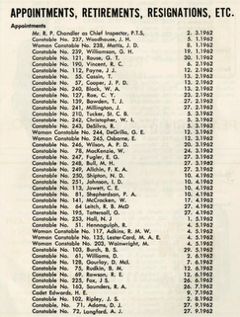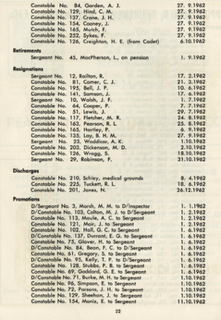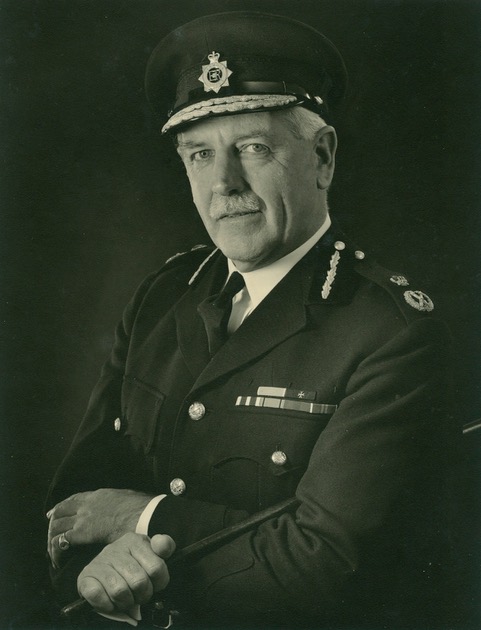 George Herbert ROBINS,
George Herbert ROBINS, Introduction to 1962
This is the second in a series of articles by Retired Detective Superintendent George Rose about the years during which the Bermuda Police was headed by Commissioner George Robins. In the first article, covering the period from the start of his administration on 1st April to the end of December 1961, Mr. Robins outlined several of his objectives as follows:
“More Bermudians in the Police Force, prompter response in emergencies, and smarter summer uniforms with a possible return to the traditional police helmet made famous by London’s bobbies.” He stressed the need for innovations as part of the normal “evolutionary process made necessary by the tide of events, more traffic, greater population, a more intense way of life, and Bermuda’s growing status as a tourist resort.” Mr. Robins envisaged the need for police patrol boats, and the setting up of our own Police Training School offering initial training courses on a par with those in the U.K.
By the end of 1961 the Police had a centralized police headquarters at Prospect; a reorganized administration structure with four new Superintendents; the hiring of an experienced policewoman from the UK with the intention of creating a policewomen’s department; and a decision being made for the police to upgrade their uniforms including new “Bobby helmets” for male officers.
George Rose has carried out extensive research and his articles cite numerous official documents and media reports verbatim. He starts the year 1962 with a Royal Gazette article covering the annual inspection of the Police Force by Governor, H.E. Sir Julian Gascoigne, at which Mr. Robins made good on one of his first objectives, with his officers participating in the annual inspection smartly dressed wearing their new style uniforms, including “bobby helmets”.
In order to be able to hire more recruits, the construction of new barracks at Prospect commenced in January and were completed in April; in February Parliament approved Mr. Robins’ request for an increase of Sergeants and Inspectors; in March our first ever 3 month Basic Training Course, on a par with UK Training Schools, was held and provided local recruits with much better training than in the past, and was attended by 9 Bermudians, including 3 women, and one previously untrained UK recruit, all of whom successfully graduated in June 1962.
You will also read that the Bermuda Police formed a Police Athletics Team which got off to a winning start in both local and international competitions while our various sports teams excelled at football, rugby and cricket which had a positive effect on morale. A group of police officers cleaned up Admiralty Cove and formed a Boat Club with a fleet of 17 sailing boats, while two resourceful police officers with boat building skills completed construction of the first police boat, the “Blue Heron” which led to the creation of our Marine Section.
Commissioner Robins was persistently vocal about the need for improved road safety, and the Police held their first “Road Safety Roadeo” during Road Safety Week in May, with preliminary heats in various parishes culminating in a final event held at Garrison Field Prospect, at which the recently formed Police Motor Cycle Display team showed off their skills much to the appreciation of spectators.
In July the Commissioner presented crime figures for 1961 showing a 6% drop compared with 1960 but on the negative side Commissioner Robins expressed serious concerns about juvenile crime, and suggested that Bermuda schools consider creating an Outward Bound programme along the lines of Outward Bound Schools in the UK.
On the social scene, a Police Ball was held at Castle Harbour in November at which a newly created Police Dance Orchestra performed.
In December, H.E Governor Major-General Sir Julian Gascoigne conducted the annual inspection of the Police at Prospect Field where some 100 police officers, including senior officers, “bobby” helmeted constables, policewomen, dog handlers, motor cyclists and patrol car crews - gave an impressive display of strength and mobility.
The year ended with Commissioner Robins and medical authorities strongly recommended the wearing of crash helmets to reduce the increasing number of motor cycle fatalities occurring on Bermuda’s roads. In this regard the Police, in 1962, started for the first time to include in accident records whether cyclists were wearing crash helmets which showed that no helmeted cyclists had died as a result of head injuries during the year.
______________________________________________
There was a large crowd at the Prospect Field yesterday afternoon to watch the Governor, Sir Julian Gascoigne, make his annual inspection of the Police Force, who made their first public appearance in their new ceremonial uniforms. For the first time, members of the police contingent on parade wore the London "bobby" type helmets and white tunics which are to be their official ceremonial uniform in the future. Today, for the first time, policemen on the beat will wear the helmets, which have been ordered to replace the caps worn until the present time.
Yesterday, the police contingent, which included a number of policemen on motor-cycles, in cars and on motor scooters, as well as the four police dogs and the handlers, caused much comment among onlookers as the sun shone on their white tunics and silver trappings.
The policemen, accompanied by members of the Reserve Constabulary, led by Assistant Commandant Ralph Ferguson, were marched smartly on to the field by the Band of the Bermuda Rifles, and joined the mobile police and dog handlers who had already formed on the parade ground.
His Excellency arrived at 2.30 p.m. in company with Lady Gascoigne and his A.D.C. Captain John Smiley, and was met at the dais by the Commissioner of Police, Mr. G. H. Robins.
Having taken the salute, Sir Julian inspected those policemen on parade in company with Mr. Robins and the parade commander, Chief Superintendent Frank Williams.
After the inspection, the parade, two regular police divisions led by Inspectors L. M. Clark and D. Hebbard, the reserves and the mobile division marched and drove passed by the saluting dais, His Excellency taking the salute.
Following the National Anthem, His Excellency left, and the parade came to a close.
Among those present at the ceremony were: Martin Grimes, Mr. Sidney Kemsley, Mr. W. A. Manuel, Mr. A. A. Francis, M.C.P., Mr. R. E. Outerbridge, M.C.P., Mr. H. B. L. Wilkinson. M.C.P., Mr. A. E. Nicholl, M.C.P., Mr. G. A. Cooper, M.C.P., Mr. G. R. Groves, Lt.-Col. Angelo-Thomson and Mr. Norman Golding.
The Britannia turboprop aircraft taking Princess Margaret to Antigua was delayed in Bermuda for 19 minutes according to a spokesman for the British Overseas Airways Corporation. A contributory cause of the delay were the strong headwinds and the disembarkation of passengers.
The Governor's A.D.C. Captain John Smiley, met the aircraft. He was dressed in civilian clothes. Also among those at the airport were the Commissioner of Police, Mr. G. H. Robins, the Director of Civil Aviation, Wing Commander E. M. Ware, Mr. Fountain, Chief Superintendent Frank Williams, head of the traffic branch, and Inspector John Starbuck, in charge of the Eastern Division.
The Princess’ plane left the ground at 7 a.m. with Captain Tebbit, who had taken over the plane with a fresh crew, at the controls.
 London? No, but after seeing the “bobbies” helmets
London? No, but after seeing the “bobbies” helmetsColony-wide Road Safety Week in May or June, is being planned by the Bermuda Police Force, and every Government department, private organization and club will be asked to help. A preliminary meeting will be held in the Chamber of Commerce Rooms on Tuesday. January 23, to which various organizations have been invited. “Such a week," Commissioner G. H. Robins says in a circular which is being sent out, "requires a lot of preparation, organization and support from those Government departments, organizations, and clubs who are interested in safety on the roads and the reduction of accidents."
On the agenda for the initial meeting will be the election of three sub-committees to deal with publicity, finance and the week's programme, as well as the fixing of the date of the week.
But for a medical examination and a probation officer's report, both of which were requested by the Hon. Myles John Abbott, the Chief Justice, the opening session of the 1962 Hilary Assize might have gone down in the history books as the shortest criminal assize in the Colony's history. The session lasted only half-an-hour and was attended by the pomp and ritual which heralds the opening of the four yearly traditional criminal assizes.
The Chief Justice mounted the bench resplendent in his scarlet robes and full bottomed wig. He was attended on the bench by the Bishop of Bermuda, the Rt. Rev. Anthony Williams and the Commissioner of Police, Mr. G. H. Robins. The Bishop was vested in a red robe covering a purple one. The Commissioner of Police was attired in full dress uniform with white tunic.
The Bishop appeared at the assize as a guest of the Chief Justice. According to Lt.-Col. W. T. Angelo-Thomson, Registrar General, the procedure dates from the days in Bermuda when the assize service at the Cathedral immediately preceded the opening of the assize. Following the service it was the custom for the Chief Justice to invite the Bishop to accompany him to the opening of tile session as a gesture of courtesy…
An auction, the result of a writ of execution issued by the Supreme Court, will be held at the Police Stores near the Traffic Department at Prospect on Wednesday. The writ will be executed by the Provost Marshal of Bermuda, Mr. G. H Robins, Commissioner of Police, with the authorization delegated to him by the Supreme Court. In Bermuda the Provost Marshal serves as bailiff, the person who in the United Kingdom would ordinarily execute such a writ.
In reply to debate in the House of Assembly by Mr. Henry Vesey, M.C.P., letters were forwarded to Mr. Vesey and the Hon. V. L. Tucker, chairman of the Transport Control Board by the Bermuda Pollice Force.
At the time Mr. Vesey asked if the police could not take more steps to control noisy auxiliary bicycle riders. He said he hoped the Commissioner of Police, Mr. G. H. Robins would not take his comments in the wrong way. The police letters gave the following statistics concerning summons and convictions for excess noise and speeding.
In July, some 40 vehicles were impounded by the police. There were eight noise convictions out of this number or 20 per cent of the impounded vehicles. Eleven speeding convictions were obtained and 60 convictions for other defects from 26 vehicles were obtained.
In August the number of cycles impounded rose to 44 with eight convictions for noise being recorded. There were eight speeding convictions and 74 convictions from 38 cycles for other defects.
The September total dropped to 24 cycles impounded with six, or 25 per cent, convictions for excess noise. Ten speeding convictions were obtained and 40 convictions for other defects on 25 cycles were recorded.
The October figure for cycles impounded rose again to 40 and 14 convictions, or 35 per cent, were recorded for excess noise. Seven speeding convictions were obtained. On 33 cycles, 84 convictions were obtained for other defects.
In November 20 cycles were impounded and three convictions for noise were recorded. There were 11 speeding convictions and 33 convictions on 22 cycles for other defects.
The December total of cycles impounded was eight. Two convictions for excessive noise were obtained, or 25 per cent, and four speeding convictions were recorded. Six cycles led to 15 convictions for other defects.
A police spokesman said the December total was low because many of the police constables ordinarily engaged in speed and noise control were required for duty in other areas, such as security for the Bermuda Meeting, 1961.
A suggestion that “higher-ups should set the example” was voiced yesterday at a road safety meeting held at the Chamber of Commerce rooms in the interest of road safety.
Views were expressed upon the completion of preliminary plans for the forthcoming Road Safety Week. A group of over 50 representatives of the community including clergymen, businessmen and representatives of social organizations were present.
Introductory remarks were made by Commissioner G. H. Robins of the Bermuda Police Force who explained the purpose for which the meeting was called. He said he hoped that everyone who was interested in the problem of road safety was present. The programme was launched, he said, at the schools where talks had been given to the lower forms. However, this was only the beginning. The cooperation of the community at large would provide the tremendous impetus which was needed to make the programme a success.
Mr. Plowman stated that although Bermuda did not have the type of traffic problems or traffic accidents that occurred elsewhere, its problems were serious enough. Efforts being made by the police, he said, should be supported by everybody in Bermuda.
The question of forming a committee for publicity in schools was brought up. Dr. Kenneth Robinson, representing the Department of Education, suggested that the matter be left open. Time allotted to expression of opinions was used by some who had very definite views on certain phases of road safety.
Mr. Arthur Card, appearing as a private citizen, had much to say on pedestrian courtesy. There are three types of pedestrians, he said: the ignorant, the careless and the downright arrogant type. He expressed regret that there was not some law locally which would make pedestrians walk on the correct side of the road, use pedestrian crossings and use caution when approaching intersections.
Referring to a particular incident, he said: ''A young man stepped in front of my car and said, 'Hit me, hit me', and brother, I was tempted," Mr. Card declared.
His remarks about pedestrians at night were endorsed by a Mrs. Canton, who was present. She said that it was extremely difficult to see pedestrians who wore dark clothing at night. A further comment on driving with lights in stormy weather was offered by Mr. Card. He suggested that drivers should take street lights as their guides. If they were on, then car lights should also be.
The Wor. A. W. Sedgwick and Sergeant Rose Neville of the Bermuda Police Force will be speakers at a meeting of the West End School Parent Teachers Association on Sunday at 4 p.pm
Mr. C. C. Snaith, headmaster of the school, stated that a topic of interest will be discussed and he hopes parents and other interested will be present. A short musical program will be given and tea will be served. A collection will also be taken to aid the association.
Rain spoiled plans for a march-past of the St. John Ambulance Brigade yesterday, but did not dampen the spirits of those gathered at the Health Centre to witness the presentation of 1961 awards.
Guest of honour was Police Commissioner G. H. Robins who addressed the group and made the presentations. He was introduced by Mr. John Fountain, district commissioner of the Brigade Association.
Mr. Fountain reported a highly successful year for both the cadets and the nursing division. During 1961, he said, hundreds of hours had been taken up with attending public functions and their carrying out tasks assigned. A special word of praise was extended to Mrs. Bessie Barton, district superintendent of the brigade, for her dedication.
Mr. Fountain termed the guest speaker an active worker in the St. John Ambulance Brigade. Mr. Robins and his wife had done outstanding work in Cyprus during the emergency there, said Mr. Fountain.
Speaking on Cyprus, Mr. Robins said that he and his wife had done a great deal of first-aid work. His wife, even today, carried with her a reminder of the experience — bits of a bomb lodged in certain parts of her body. He reminded his audience of their mottoes: The first, "Per fide" — for the faith, has as its objective the moral and spiritual strengthening of mankind. He remarked that this motto was upheld each time the St. John Ambulance Brigade opened their meetings with prayer.
"You will have in your daily life always an opportunity of carrying out the lessons that you have been taught," he said. "Accidents always happen."
He mentioned the service of Miss Katherine Mortimer, divisional superintendent, "who attends every local match," This was but one example of one of the many ways in which members of the brigade could carry out the motto of works of charity for humanity for mankind.
[Commissioner Robins] was thanked by Mrs. Barton. Mr. Fountain expressed the hope that 1962 would see the forward march of the brigade cadets, and the nursing and ambulance departments.
Winners of awards were: Certificates — Mrs. Anne Maule, Miss Barbara Briggs, Miss Sandra Turney, Mr. Michael Sandford, Mr. Edward Gauntlett, Miss Annette Heyliger, Miss Sandra Powell and Miss Geraldine Pearman. (The last three were absent through sickness or were away from the Colony.)
Cups were won by Catherine Matthews and Granville Madeiros, of the cadets, and Miss Helen Dowling of the nursing division.
A change in the establishment of the Bermuda Police Force, designed to give added incentive to the men, was approved by the House of Assembly yesterday, but with one alteration. The House agreed with the recommendation of Police Commissioner G. H. Robins that the number of Inspectors be increased from 11 to 13 and the number of Sergeants from 39 to 49.
But, at the suggestion of the Civil Service Committee, members turned down the commissioner's request that a supernumerary chief inspector be recruited for three years outside the force to supervise training. Under consideration was a report from Mr. Robins which had been presented to the House by Mr. C. V. Zuill, chairman of the Civil Service Committee.
"Mr. Robins has asked to be able to keep a permanent post open and bring in a training officer for three years only, but the committee feels that there is no need to go to Ihe additional expense of this extra man. " "He will leave after three years having trained other men and a person appointed to his post would carry on training."
Mr. Zuill moved that the commissioner's report be adopted with the exception of the paragraphs referring to the chief inspector of training.
Mr. S. S. Toddings asked if the commissioner was aware that the Civil Service Committee did not approve of this post. "I have informed him to that effect," Mr. Zuill replied.
"And he doesn't think this deviation will reduce the efficiency of his force?" Mr. Toddings asked.
Mr. Zuill: "He would naturally like to have his requested post."
Mr. E. H. Barnes asked how any money could be saved by the increase in the number of inspectors and sergeants if it only meant the saving of one constable.
Mr. Zuill explained that, the promotion of constable to sergeant or from sergeant to inspector meant an increase in pay of £50 so that the actual cost would be £600.
By doing away with one constable, who was paid £850 a year, there would be a saving of £250. Over the years this would be absorbed until eventually there would be an increase of £1,250, but that would not be for some time.
"We have got a number of people who well deserve vacations . . . I'm sorry, I meant promotion," Mr. Zuill added, amid laughter. "They cannot get this because there just is not room for them.
Sergeants are needed for various posts and to carry out essential work, and I am quite satisfied this is a very sound suggestion.''
Mr. Barnes remarked that Bermuda was going to have a force of too many officers and not enough constables if it was not careful. (something, which Mr. S. S. Toddings said was a “Chinese Army.”)
Caught up in the proposed re-arrangement of the police force, which the House of Assembly approved on Monday, was the Police Cadet Force. Mr. G. H. Robins Commissioner of Police stated as follows about the cadets:
“At present cadets are included in the establishment of the Force, and are given the same powers, responsibilities and protection as trained constables but, because of their age and lack of training, should never have these responsibilities.
“Cadets should be regarded as a means of catching young men on leaving school, imbuing them with a sense of service to the community and police work, this reducing the period of training which they will require when they reach the age of entry into the Force.
“I consider that the cadets should be outside the establishment of the Force and that a maximum establishment of 6 should be approved and these should be regarded as potential recruits to fill vacancies in the establishment.
There are at present 4 cadets but it may well be that once local recruiting and training gets under way there may, for many parts of the year, be no cadets while at others there may be as many as 6. This should be a floating figure outside the establishment. I request approval for this in principle. If approved in principle, I will then submit a properly considered scheme for the recruitment and training of cadets, together with the financial implications.”
A memorandum from Commissioner G. H. Robins noted that the present authorized establishment of all ranks in the police force is 274. The smaller the force, he pointed out, the greater the danger of boredom and stagnation “if there is little incentive to promotion.” He went on, “For domestic and economic reasons, there should always be possibilities for promotion to the outstanding and efficient man. At present I believe the prospects to be inadequate,” the Commissioner held.
THE BERMUDA POLICE MAGAZINE – SUMMER, 1962 page 74
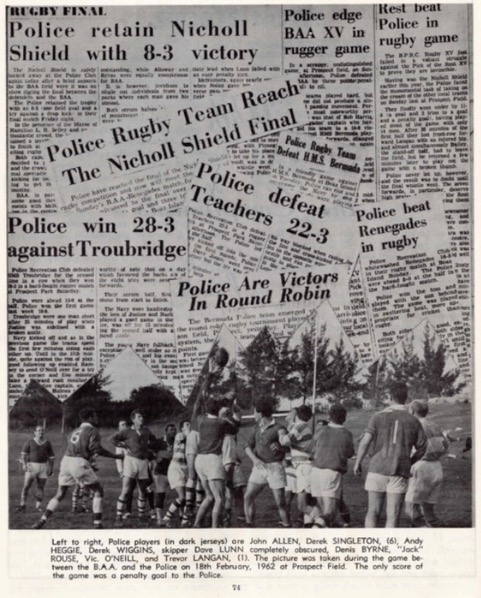
The Bermuda Police Boat Club has elected the following officers to serve during the forthcoming season:
President, Commissioner G. H. Robins; commodore, Des McSherry; vice-commodore (power), Doug Hebberd; vice-commodore (sail), Gerry Evans; secretary, George Goddard.
The club, which is a section of the Police Recreation Club, is enjoying a marked revival of interest among members of the force.
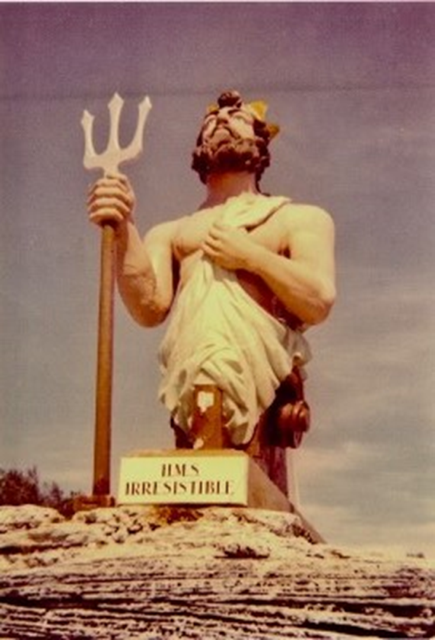
There's a look on the face of the huge figurehead from H.M.S. Irresistible that looks out to sea from Admiralty House harbour that could be interpreted as: "What in heaven's name is going on here?"
The answer lies where he cannot see it, behind his broad, flaking back at the little boat-house and beach that to the sailing enthusiasts in the Bermuda Police Force has during the past few weeks become a second home. It is there that the "arm of the law" has been employed when not on duty in turning the pretty little cove into as smart and shipshape a place as any yachtsman or power-boat owner could wish.
It all began a month ago when a day of sunshine sent the boating enthusiasts hurrying along to Admiralty House cove to see how it had survived the winter. Much had to be done, but a remarkable resurgence of interest among members has led to a clearing-up and development scheme on a scale that has reportedly delighted Commissioner G. H. Robins, himself a keen boating fan.
With money donated by members of the Police Boat Club, as this section of the Recreation Club is called, a large supply of timber, paint and varnish was purchased.
These, when completed, will give the club a proper wharf with ropes, protecting rubber tyres and mooring posts, a supply of water at the beach, and, sometime in the future, a club house.
There is more, however. Two members, Derek Jenkins[on] and Dave Garland, showed impressive aptitude at boat-building. They have already built for another member a competent little sailing craft and two others have been built by other members.
The fleet includes the five Snipes, an International 14-foot, two unclassified sailing boats, a 28-foot sloop and eight motor boats.
The Local Forces and Bermuda Rifles now taking over the Admiralty House building, have offered the club a disused out-house adjoining the main building for storing gear, and this could one day become a social meeting place for members. The boat-building abilities of the two policemen have not gone unnoticed, either, and it is in the wind that they may be called upon soon to undertake a major project outside the club.
By using their own money and talents, the police have turned the cove into a beautiful sailing spot, and soon the figurehead, forever doomed to gaze out to sea, will be able to look down upon the little armada crisscrossing the waves beneath him. Then no longer will he have to wonder what in heaven’s name is going on.
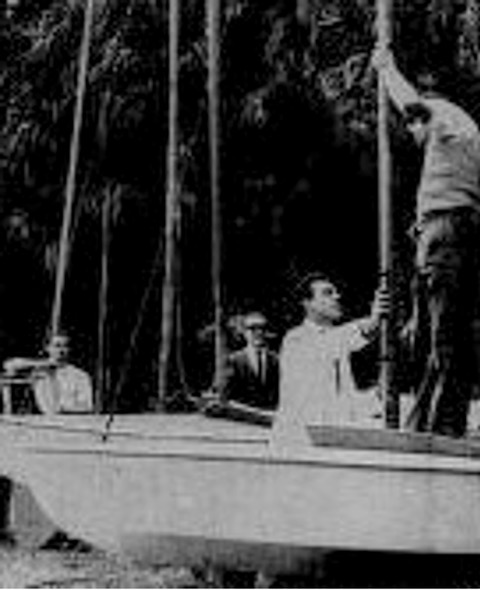
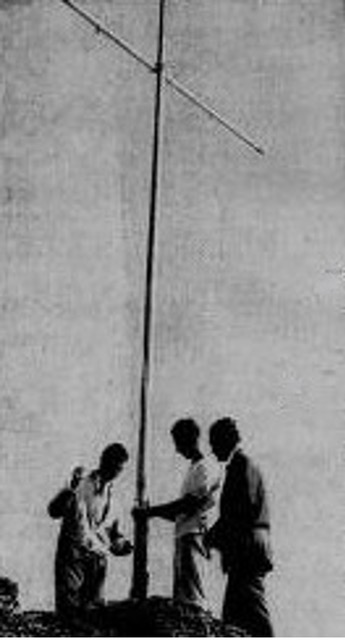

In early March 1962 Chief Inspector Roy Chandler came to Bermuda with his wife and their children Roxina, Fiona and Robert. Mr. Chandler had been a training instructor in the Cheshire police and following his arrival, he organized Bermuda’s first 3-months Police basic training course in the Spring of 1962 along the lines then operating in the United Kingdom. The training school still flourishes strongly to this day. For the first time the playing field was being leveled for local recruits.
CLICK HERE to read more about the first training school / policewomen
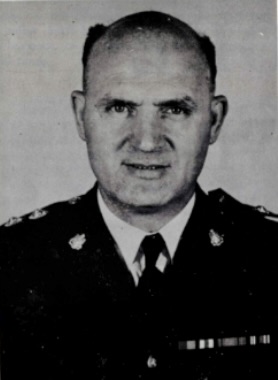
Mr. Chandler joined the Cheshire Constabulary on 31st August, 1936 and served as a Constable in various parts of the county until 1942 when he joined the Royal Navy. He left the navy in December, 1945, having attained the rank of Lieutenant Navigating officer, and returned to Cheshire.
He was promoted Sergeant in April, 1946 and Inspector in 1955. From December, 1945 to December, 1953 Mr. Chandler was seconded to the Police Training School at Warrington where he became Chief Inspector. He retired from the Chesire Constabulary on 28th February, 1962, having completed over 25 years’ service. Mr. Chandler is married and has two daughters and one son.
The first training course [in Bermuda] was started on 19th March, 1962 with twelve recruits. The course is based on the Home Office syllabus with adaptions to Bermuda law. All new recruits from both Bermuda and England will now do their initial training here. It is also hoped to run refresher courses and training for the Reserve Constabulary.
The annual Seven-a-Side rugby tournament for the Cunningham Cup will be played at the Prospect Garrison field this Sunday afternoon. Play will get under way at 12.45 but all teams are asked to be at the field no later than 12.30.
Ten teams from Police, B-A.A., Renegades and the School Teachers have entered the competition which will be played on a knockout basis. Games will be seven minutes each way with the final being played in two 10-minute periods.
The trophy, given by former B.A.A. captain Norman Cunningham before he left the Colony, will be presented to the Winning team on Sunday by Commissioner of Police G. H. Robins.
Two first round games will be played: B.A.A. "B" vs Police "B" and Teachers "A" vs Police "C".
In the second round, winners of the B.A.A. - Police game will meet Renegades 'A’ while winners of the Teachers - Police clash will take on Renegades "A."
Other second round games have Police "A" playing Police "D" and B.A.A. "A" meeting Teachers "B."
(See article below for the result of this tournament as reported by the Royal Gazette)
Details of the contests for Road Safety Week were released yesterday. Bermuda schoolchildren are being urged to participate in the week by entering safety essays and posters, in an island-wide competition during the next few weeks.
Presentation of prizes will be a featured event of the week, which opens on May 13.
Members of the Bermuda Police Force are carrying out a schedule of film showings throughout Bermuda schools to explain the need for safety measures and to give the young competitors ideas for their literary and artistic efforts.
Original judging will be done by head teachers at the schools, and they will select the two best essays and posters from each of four age groups, for final selection by the Road Safety Week Committee's judges.
Judges in the essay contest will be Dr. Marjorie Bean, Supervisor of Schools, Mr. E. T. Sayer, editor of The Royal Gazette, and Chief Superintendent Frank Williams of the Police Force. Judges of the poster contest are Mr. Gilbert Cooper, M.C.P., president of the Bermuda Society of Arts; Mr. Robert Barritt, vice-president of the society; Mrs. G. H. Robins, an artist; Mr. Ed Kelly, photographer; – and a member of the Police Department.
Rules state that both the essays and the posters must he produced in the school, and be the work of the competitor only. After the head teachers have selected the two best from each age group, they must forward the entries from their schools to Dr. Kenneth Robinson, Inspector of Schools, by Saturday, April 21, for consideration by the judges. Each finalist will, receive a momento of Safety Week, and during Safety Week, four first prizes, four second prizes and four third prizes will be presented to the winners of both contests.
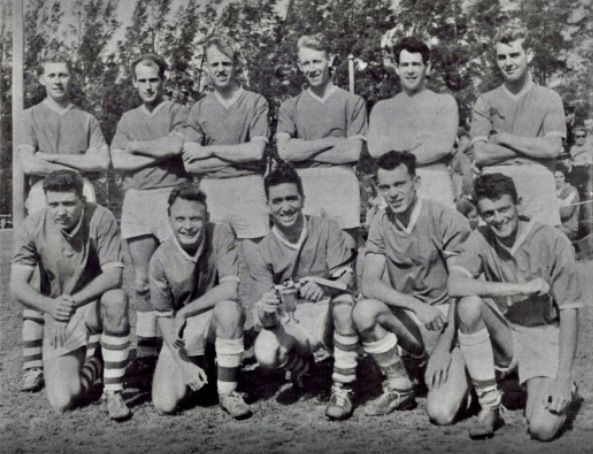
The Governor (Sir Julian Gascoigne) made inspection visits to the Somerset and St. George's police stations on Friday and yesterday.
On both occasions the Governor was accompanied by the Commissioner of Police, Mr. G. H. Robins, and Chief Superintendent Frank Williams. In Somerset on Friday the Governor was guided on a tour of the police facilities there by Inspector L.M. Clark.
The Governor first inspected a parade of constables and then made an inspection of the police station building. He also took a look at the police bachelors' quarters and saw the boat building activities which are being carried out by individual policemen.
Yesterday the Governor made a similar inspection visit to the police in St. George's. He was guided on a tour of the facilities there by Inspector Robert Ball. The Governor first inspected a parade of constables and then the police station building. After that he looked at three married men's quarters and the bachelors' quarters.
Rather than asking the questions most of the Bermuda Police Force's senior officers found themselves answering questions yesterday afternoon when seven members of the House of Assembly toured the police facilities at Prospect.
Leading the delegation from the House was the speaker, Sir John Cox. Other members included Messrs. A. E. Nicholl, O. R. Arton, A. A. Francis, W. Robinson, E. Outerbridge and Dr. W. H. C. Masters. The members were responding, in touring the police installations, to an invitation issued to the House by Mr. G. H. Robins, Commissioner of Police. Among the places toured by the members were the administration division; criminal investigation division; the new barracks; the radio section; the new training facility; the garage and carpentry shops; the traffic division and the operations room.
POLICE BUILDINGS NAMED AFTER FORMER CHIEF
The Bermuda Police Force announced yesterday the renaming of the quarters for single officers serving on the force. All of the barracks housing the officers will be named after former commissioners of police, with the exception of one which will be named after a deputy commissioner.
The new names of the barracks are:
The three new houses will accommodate 54 single police constables, Mr. G. H. Robins, the Commissioner of Police, said.
The planned auction of the contents of the J. H. Robinson dry good store on Queen Street was halted by a writ of injunction against the Provost Marshal of Bermuda, Mr. G. H. Robins.
The injunction was served by the solicitors of the executors of the Robinson estate. The contents of the store were to be auctioned on Thursday, but now whether or not there will be an auction will have to be decided in argument before the Supreme Court. May 16 is the date set for the high court hearing.
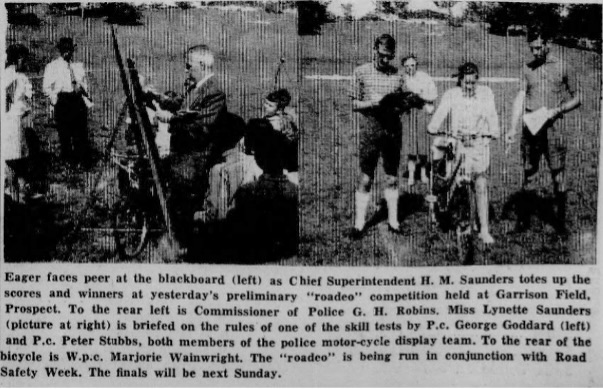
The third major event of Road Safety Week got under way yesterday in St. George's. Devonshire and Sandys when the preliminary heats of the road safety "roadeo" were run off. Already completed in the island-wide safety program are the school poster and essay contests.
Due to heavy competition from football and Armed Forces Day at the U.S. bases, the turnout for the ‘roadeo’ preliminary heats was small, but those entering showed keenness and determination in the nine good driving events run at each of the three contest points.
The entrants in the events competed in two groups — one for ages nine to 12 and the other 13 to 15. A competition was also held for auxiliary bicycle owners between the ages of 16 and 20.
Before the bicycle owners could compete in the driving skill tests their vehicles had to pass a rigid safety examination. Then they attempted to score the maximum number of points on a straight lane balance test; straight line test: figure eight steering test; signaling, mounting and dismounting test; single obstacle test and braking test; double obstacle test; double zigzag obstacle test; emergency turn and stop; and turning around test.
Today the first Road Safety Week road safety display will be put on by the Bermuda Police Force at Garrison Field, St. George's. On Tuesday the program will be presented at Whitney Institute. On Wednesday and Thursday, Garrison Field. Prospect, will be the site of the demonstration.
The Governor will be in attendance for the Thursday performance. A double show will be presented on Friday. In the morning the safety team will perform at Warwick Academy while in the afternoon they will travel to Sandys Grammar School.
Following each safety demonstration, the Police motorcycle display team will present their precision driving show.
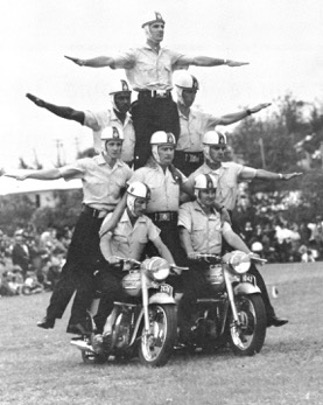 Members of the Police Motor Cycle Display Team
Members of the Police Motor Cycle Display TeamCLICK HERE for our ExPo article on the History of the Police Motor Cycle Display Team
B.A.A. track and field captain Michael Boorman sparked his team to victory over Police and Kindley Air Force Base in their triangular meet under lights at the B.A.A. field on Friday night.
B.A.A. finished with 100 points to 91½ for Police and 61½ for Kindley.
Boorman (BAA) placed first in the 100 yards and the 220 and was on the winning team in the 4 x 110 and 4 x 220 relays. At the conclusion of the meet, Boorman received the Nicholl and Ashton Shield from Commissioner of Police G. H. Robins who had been introduced by Ralph Ferguson.
Another meet is scheduled for this Friday night starting at 7.30. Details have not yet been completed but there is a possibility B.A.A., Kindley and Police will meet again.
[Bermuda police officers taking part included:
Team Points – B.A.A. 100, Police 91½, KAFB 61½.
We take pleasure in reproducing the following letter which we received from Mr. Grey after he had left the colony and we take this opportunity of wishing him every success in the future."
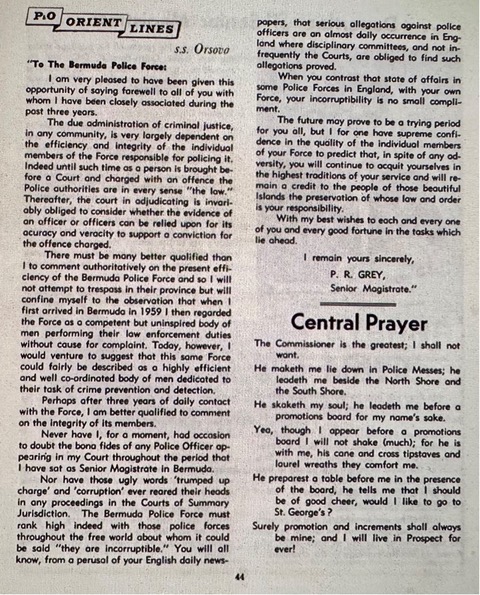
Dear Sir,
I read in your issue to-day Saturday May 26, that a strong letter has been addressed to me by the secretary of the Hamilton Parish Arbor Society on the subject of bottles and trash being thrown from trucks, taxis and cars. As considerable publicity has been given to this letter before I have received the original and had an opportunity to reply, I should be grateful if you would give equal publicity to the following points:
a) The Bermuda Police are as interested as any other residents of Bermuda in keeping Bermuda safe and clean for tourism.
b) The success or failure of police to fulfil their role depends largely on public cooperation and the Courts.
c) Seldom do people throw battles and trash from vehicles when they see a police officer in a car or on a motor-cycle following. Detections are not therefore easy.
d) None the less police have successfully prosecuted in the courts such persons when detected.
e) If the public would report to the police, date, time and place and vehicle number from which bottles and trash are seen to be thrown, the police would investigate and of possible prosecute.
f) But as the police can only enforce the law through the Courts it will be necessary for members of the public reporting such incidents:
1) To identify the thrower; to give evidence in Court.
2) The matter of trash in public places has been the subject of discussions tor a long time between the police and Government departments who are also directly concerned.
3) Meanwhile, I can assure both the Hamilton Parish Arbor Society and the public in general that the Bermuda Police are fully alive to their duties and responsibilities in helping to preserve the amenities of these Islands, whether on the water or land, on beaches or roads, in parks or other public places.
Yours faithfully,
Bermuda's Commissioner of Police Mr. G. H. Robins, has been called to Nassau, Bahamas, to appear before the special commission of inquiry into charges of improper conduct laid against two officials of the Bahamas Police Force.
Mr. Robins left yesterday at short notice, having intended to be present at the launching ceremony of the new police launch at Admiralty House in the afternoon. Apologies for his absence were made by Chief Superintendent F. B. Williams, who explained that the Commissioner had been called away on an urgent matter to Nassau. It is understood that Mr. Robins had been expecting for some time to be called to give evidence at the inquiry, but had not been informed of the specific date.
He last visited Nassau several months ago for a course on crowd control and later a Nassau police official came to Bermuda to conduct a similar course here for Bermuda police officers. The Bahamas Commissioner of Police, Lieut.-Col. Colchester-Wemyss, and five other police officers are now being investigated by the special commission in connection with charges made in the House of Assembly by Mr. Roy Solomon.
On Thursday last it was learned that Police Deputy Superintendent Norman Tovey, who was not one of the officials involved, had been found dead in the sea and that suicide was suspected. The inquiry opened on Monday, May 21, before Sir Alan Pugh, a judge, Sir John Nott-Bower, former chief of London's Metropolitan Police Force, and the Hon. Godfrey Higgs.
The long arm of the law in Bermuda now wields a trusty boathook, for from today the Police Force will be backing up its land attack on crime with a sleek, fast motor launch with the innocuous name of "Blue Heron."
She is not just any old launch, however. As the group who attended her launching at Admiralty Cove yesterday discovered, the "BLUE HERON" is a tribute to the initiative and skill of two British policemen. They conceived the idea of building her, they drew the plans, they put her together piece by piece and yesterday they finished off the job by knocking away the supports and guiding her into the blue waters of the bay after Mrs. G. H. Robins, wife of the Commissioner of Police, had performed the launching ceremony.
 Dave Garland and Derek Jenkinson
Dave Garland and Derek JenkinsonChief Superintendent F. B. Williams had previously told how the two men, P.c. Derek Jenkinson and P.c. David Garland, built the craft for £125 with materials supplied by the Corporation of Hamilton, and have powered it with engines lent by the Board of Trade.
The Corporation Harbourmaster, Capt. Stanley Burns, was also there and after the ceremony he discussed the possible basing of the craft at the old Yacht Club steps on Front Street.
Two officers have been appointed to carry out the patrols. Preliminary speed trials with an engine of less power than the ones to be fitted indicate that the launch will be faster than at first thought.
The name "BLUE HERON" was not chosen because that bird is prone to catch small and big fry. It was arrived at alter much thought as being one of the few names not used locally. Already this summer there have been reports of near tragedies involving motor boats. On Sunday, it is understood, two boats collided on Harrington Sound and one was damaged so severely that it sank immediately.
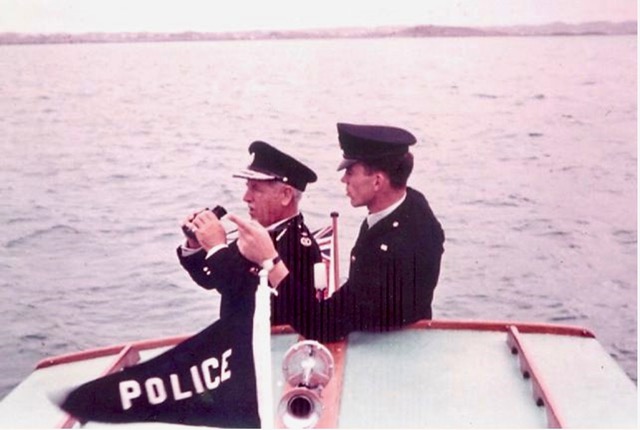 JUNE 1962
JUNE 1962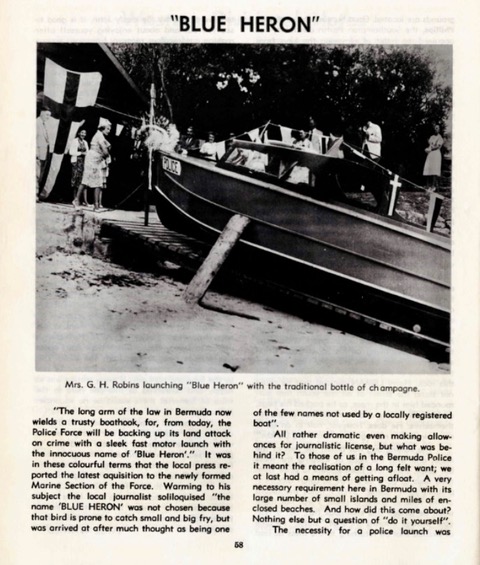
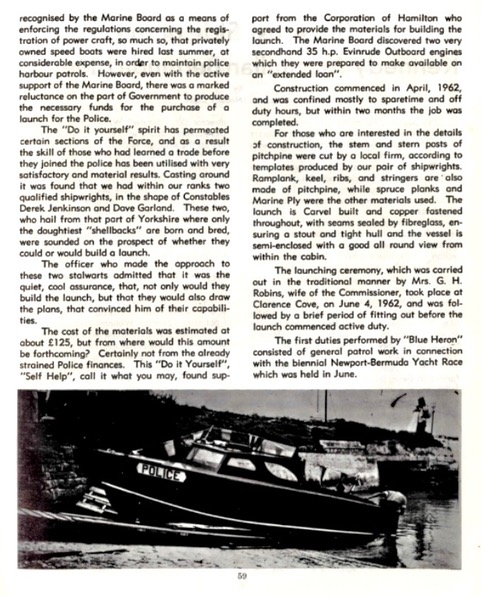
CLICK HERE to view the above article in our Police Magazine 1962 Summer edition
At 8 a.m. this morning the Bermuda Police Force goes into its official summer uniform after the Executive Council agreed to the new garb yesterday. Previously, the police were attired in blue caps and khaki shirts, shorts and stockings, but beginning today their uniform becomes blue from helmet to stockings. The summer uniform for sergeants and constables consists of blue “peeler,” blue shirt, blue shorts and blue stockings. For summer wear the helmet will not be used with the traditional chin strap.
The officers' summer uniform will consist of white shirts, blue shorts or trousers and blue stockings or socks.
A police spokesman said the new style came about as a result of discussions and suggestions from the Executive Council following the viewing by the Council of the new helmets and ceremonial uniforms last year.
Five police officers modelled various combinations of summer uniforms before the Executive Council yesterday including an ensemble of trousers, white bush shirts and white helmets. The Council then decided on the blue shirt, shorts and socks combination with a blue helmet.
BEFORE…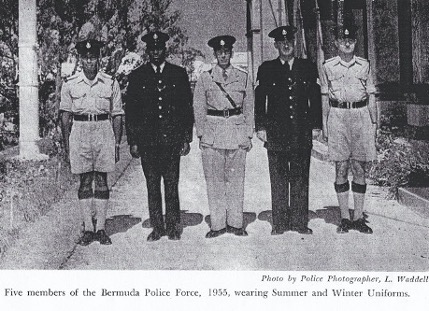
AND AFTER…
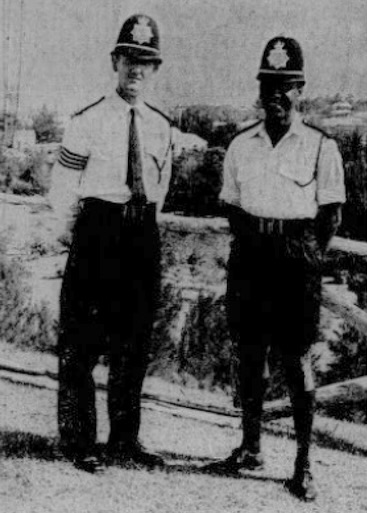
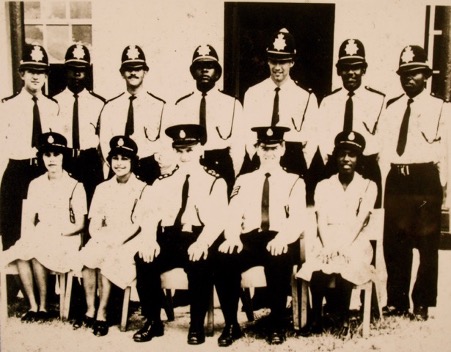 Top Row (l-r) Raymond "Sleepy" DeSilva, Calvin Christopher, Arthur Bean,
Top Row (l-r) Raymond "Sleepy" DeSilva, Calvin Christopher, Arthur Bean,
In a smart display of marching and traffic hand signals, the first ten recruits to graduate from the Bermuda Police Force's training school at Prospect officially passed out of their three-month course yesterday afternoon.
The Commissioner of Police, Mr. G. H. Robins, inspected the new men and women police constables and took the salute at the brief ceremony at the old Garrison parade ground.
Mr. Robins reminded the graduating recruits of their responsibilities to the public. They had the original responsibility in enforcing the law, but at the same time they must realize they were public servants.
Mr. Robins praised Chief Inspector R. P. Chandler, head of police training, for organizing and carrying through the force's first three-month basic training course in the short time he had available. Mr. Robins also commended Sergeant James Moir. P.c. Eric Simpson and the other lecturers who assisted in the course.
Those passing out yesterday, were women police constables G. E. DeGrilla, J. D. Mattis and E. Osborn. The police constables who passed out were C. E. Christopher, W. I. Christopher, R. D. Silva, J. J. Payne, C. B. Tucker, W. A. Dill and A. H. Bean.
Also at the ceremony, Mr. Robins presented 11 members of the force with lifesaving awards from the Royal Life Saving Society of England. The awards were the results of an examination which satisfied the local examiner, Mr. Peter Welch, that the men were capable of saving life and performing artificial respiration.
The highest award (the second highest award offered by the R.L.S.S.) was the award of merit which went to P.c. M. F. W. Johnson. He also won a bar to his bronze medallion and a costume badge.
Those who received their bronze medallions were D. J. Barnett, C. D. Crockwell, N. N. Packwood, L. M. Edwards, L. E. N. Rawlins, M. W. Gibbons, G. L. Washington and E. C. Foggo. C. D. Smith received an intermediate certificate.
RG Monday, June 18, 1962
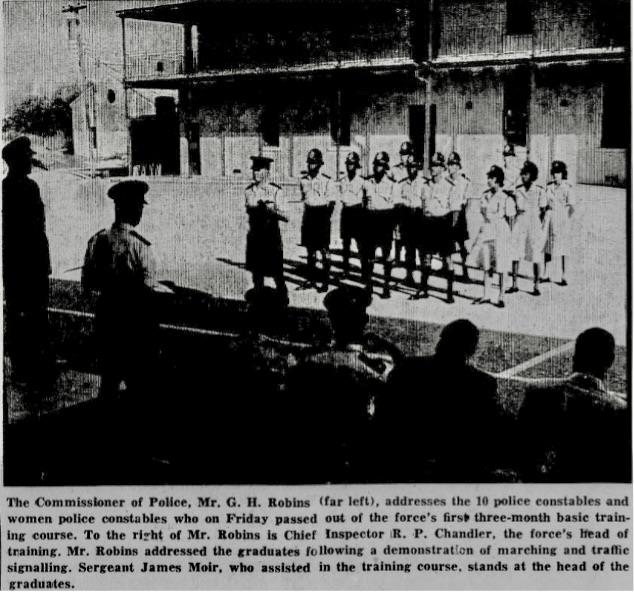
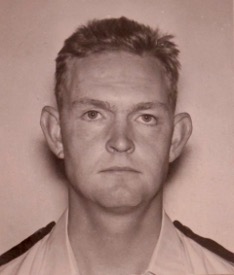
1). One significant change that occurred during my time on the [Bermuda] Force was the changeover from Ex-Military types (the availability of National Service (NS) men had been drastically reduced when Britain terminated National Service in 1960), e.g. my own case being that I was one of the very last NS men with the subsequent employment of trained young British City and County Police Officers. These new guys after an orientation period were introduced into the Force, while Bermuda logically was training Bermudians, largely coloured Bermudians. I felt that the introduction of the non-military types slowly destroyed the esprit de corps that existed when I first arrived. The new chaps lived more by the rule book.
2). Perhaps the worst Criminal case that we encountered in my time in Bermuda happened in the early Spring of 1964 with the brutal attack and attempted rape of a Scottish nanny who was employed by a wealthy couple who lived on the outskirts of the golf course at the Castle Harbor Hotel. The lass after she had put the kids to bed, was beaten about the head with a solid glass ash tray then dragged from the house and tied to a tree where an attempted rape had been unsuccessfully tried. She was then left and subsequently found by her returning employers.
The lass although significantly injured was released from hospital after about a week and she remained on the island until the case was resolved. Unfortunately, the villain wasn’t soon apprehended and the case dragged on for over six weeks causing an intense negative effect on tourism. Fingerprint evidence on the assault weapon and the description given of the attacker, being a light skinned individual, resulted in the Police Commissioner [G. H. Robins] ‘volunteering’ all Police Officers to submit their fingerprints for exclusion. Following the case being solved, at a later time the Commissioner conducted an informal ceremonial bonfire at headquarters of the Police Officers’ finger prints.”
CLICK HERE to read more of “Alfie’s” interesting article on police life in Bermuda in the early 1960’s. John "Alfie" Fox (expobermuda.com)
A weird treasure hunt took place around the islands of the Sound yesterday as Bermuda Police Force officials were guided into a cave and also shown three locations off islands where booty from the rash of recent petty thefts of boat equipment had been dumped.
The guide was one of three juveniles who were apprehended on Thursday by police officers working on the Blue Heron, the [new] police launch.
Yesterday the youth, a juvenile girl and another juvenile boy were brought before the Wor. A. W. Sedgwick and charged with stealing from boats. The two boys were released until their case can be heard by a juvenile panel, but the girl was remanded into a place of custody pending her hearing.
Mr. G. H. Robins, Commissioner of Police, provided his own sea skiff, Ktima, for the hunt and took the helm during the search which covered two locations on and around Hawkins Island; an off-shore location by Grace Island; and a spot in Riddell’s Bay. The youth on each occasion showed P.c. Brian Malpas and D.c. Michael Leng the locations where he and friends had hidden or sunk the fruits of their seaward roving.
Off Grace Island, P.c. Malpas, the police diver, recovered an outboard engine in the shallow water. The other locations where outboards were also allegedly sunk will be searched by P.c. Malpas early next week when he dons his underwater diving gear.
On Hawkins Island the constables recovered a boat pump and a tool kit, containing some food and other items, cached in a small pirate-like cave at the water's edge.
The apprehension of the youths by the officers on the Blue Heron on Thursday marked the first occasion when the launch had been used to capture a person or persons in the pursuit of a criminal activity.
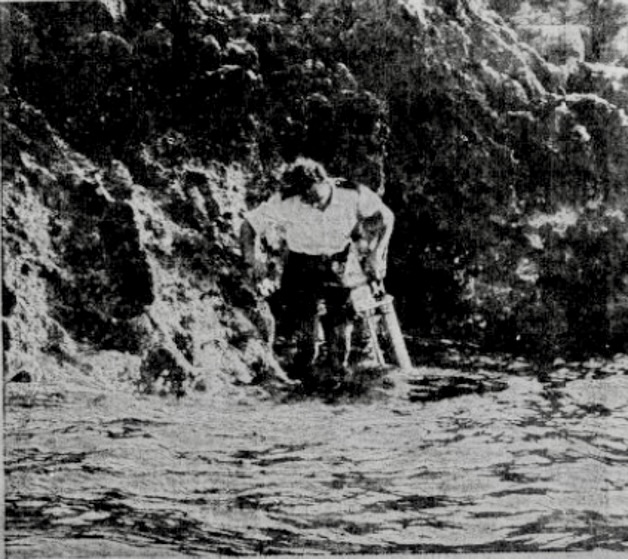
A total of 2,704 crimes, including the removal of 1,175 cycles, were committed in Bermuda in 1961, compared with 2,878 in 1960, a drop of six per cent. Of the 1,175 cycles removed, 950 were recovered, 149 persons were prosecuted and 139 convictions obtained. Excluding cycles, the percentage of crimes cleared up was 44 per cent, compared with 38 per cent in 1960. During 1961 a total of 680 persons were arrested for crime, of which 141 were juveniles, 326 were between 16 and 21 years and a further 135 were between 22 and 30 years. These details are contained in the 1961 report of the Police Department, received in the House of Assembly yesterday.
"This increase in convicted juveniles is in part due to the remarkable activity throughout the year of the specialized cycle squad," the commissioner continues. "The majority of those involved in cycle removals and kindred offences is the 16 to 21 age group, but there were, however, many cases of breaking and entering of premises by children under 16.
"The problem of juvenile delinquency is one that requires the urgent, sympathetic and active interest of all those in and out of Government who have a care for the youth of Bermuda and the future.
"Another urgent necessity is a Home for Young Girls in need of care and attention on committal toy a panel or court."
In his comprehensive survey of the year, Mr. Robins wonders whether a sentence in the Junior or Senior Training School is sufficiently punitive to deter persons from removing cycles, as a large proportion of those convicted had previous convictions.
During the-year considerable efforts have been made to train members of the C.I.D. in this aspect of police work and at the same time use and co-ordinate the somewhat limited facilities which are available in Bermuda, so that the Police may take advantage of what is available. One office in headquarters has been built into a small laboratory and such work as comparing the layers of paint in a flake of paint, comparing hairs and fibres, dealing with broken headlamp glass, comparing pieces of metal broken off cars in hit-and-run cases, and reproducing filed-away frame numbers is now carried out by/members of the C.I.D.
The standard of photography and micro-photography has reached a high standard and excellent results are being achieved. In addition, help and advice has been received from Mr. Hughes, the chemistry master at the Technical Institute, and we are most grateful for the facilities afforded us by Mr. Gordon Groves, Director of Agriculture, and his staff in the laboratory at the Botanical Gardens, and to Mr. Stanley Moore for the facilities afforded us at the Pepsi-Cola laboratory.
More equipment is being made available for use by members of the C.I.D. and with more training and experience even better results will be achieved and much better use made of material and clues found at scenes of crime and in hit-and-run motor vehicle accidents.
Editors note - Mr. Moore later donated items of equipment to the Police for use in forensics, including a Higler spectrograph, a Zeiss comparison microscope, and a Zeiss high and lower power stereo microscope.
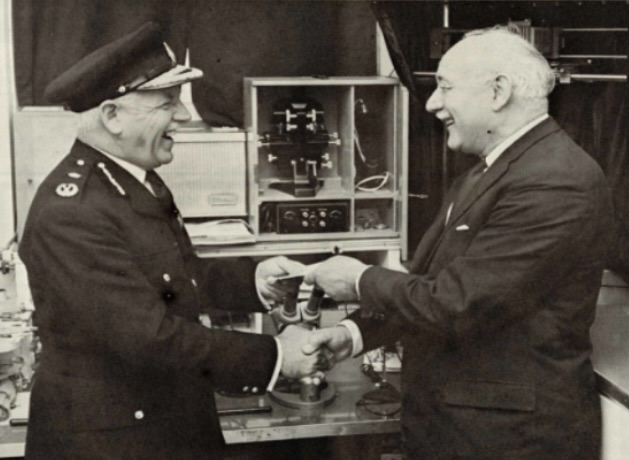
Bermuda's problem of teenage crime is not much different than any number of places elsewhere in the world. In fact, it is almost 15 per cent lower than in England and Wales. But, in the words of Mr. G. H. Robins, Commissioner of Police, it is "rather out of proportion to the population of the Colony." In an effort to air the problem and to bring out some, but by all means not all, of the roots and solutions to the problem, The Royal Gazette last week sat down with Mr. Robins to discuss the crime situation in Bermuda among younger people.
"A disquieting feature (of the crime statistical tables appended to the report) is the total number of juvenile criminals, which has increased by 21 over the 1960 figure, and there is an increase of 50 persons arrested between the ages of 16 and 21."
Mr. Robins laid a large part of the blame at the feet of the parents of many young offenders. He said one of the most important things necessary in the battle against rising delinquency was to "bring home to parents their responsibility in the morals of their children."
He noted that in Bermuda it was not uncommon to find young girls pregnant at 13 and 14 years of age. In this field the women police are now, and in the future will offer a solution to part of the problem, Mr. Robins said. However, this problem was not so much of one for the police, but rather for the social workers, the churches and again most of all, the parents.
Again he reiterated the importance on the responsibility of the parents to restore the child's moral equilibrium. Mr. Robins noted that there is statutory provision for the punishment of parents or guardians who allow a child in their charge to be ill-treated, neglected, subjected to unnecessary suffering or subjected to injury to health.
Last week, he asked: "They (the training schools) do a good job, but is it a sufficient deterrent?"
He said the purpose of the training schools must be twofold to be effective. First, they must be a deterrent to further criminal activities and second, the more important of the two, they must teach the young offender to become self-sufficient.
Whether they fulfil their dual purpose was the point to be considered. Would corporal punishment be a deterrent to the young offenders, Mr. Robins was asked by The Royal Gazette.
"Corporal punishment would help, but it seems to be anathema to some people these days," he replied.
Would he be in favour of corporal punishment? "I don't advocate corporal punishment, but it would have a very good effect. There is a lot of public antagonism towards it."
Turning to other aspects of the treatment of young offenders, Mr. Robins said there was an "urgent necessity" for a home for young girls. He said the Salvation Army home was admirable, but not the whole answer. Government grants were needed, he felt, to enlarge this home and legislation required to provide for a means of keeping the girls in the home. At the present time they may leave at their own discretion.
How could the rash of youthful crime be halted the commissioner was asked. "I don't know what the answer is," he responded frankly. He said that the youths needed some form of excitement — a place to give vent to their inherent characteristic of exhibitionism. One way of doing this might be at an auxiliary bicycle race track — a suggestion made by him last year. Here, he said, they could race cycles built just for racing — cycles that would not be allowed on the roads. "Let them see just how good they are,” he said.
Mr. Robins said the schools, through their courses in sailing, camping and other out-of- doors activities, teach the youths self-reliance with satisfaction. They build character and perhaps most important serve as an outlet for youthful emotions — the same emotions which may lead a youth to remove an auxiliary bicycle.
The female branch of the Bermuda Police Force has increased by leaps and bounds recently and we now boast a total strength of eight members – one Inspector, one Sergeant and six Constables.
Inspector Lee, who is in charge of the unit, arrived in Bermuda on March 4, 1961, and was the sole female member of the force until the arrival of Sergeant Neville on October 13, 1961. During this time efforts were made to recruit local women but it was not until January 7, 1962 that W.P.C. Mattis joined. On March 12, 1962, W.P.C.’s DeGrilla and Osborne were enlisted and they joined W.P.C. Mattis on the first full length training course to be held in the Colony.
As recruitment of suitable local women was still difficult, three Policewomen were recruited from the United Kingdom. They are W.P.C.’s Adkins, Lester-Card and Wainwright, all of these members had previous police experience in U.K. forces.
At the present time all the women are stationed in Central Division where they work three tours of duty, 8 a.m. – 4 p.m., 6 p.m. – 2 a.m., and 11 a.m. – 7 p.m. The are mainly engaged in normal beat duties and deal with all incidents concerning women and children. They visit Eastern and Westen Divisions as and when required.
It is not anticipated that a larger strength of women will be required in the future but it is hoped that although few in number the women will become an integral part of the Bermuda Police Force, working side by side with their male colleagues and specializing in work to which they as women, are best suited, namely that of dealing with women and children.

An outline of some of the duties of the colony's Women Police is contained in the annual report of the commissioner of police Mr. G. H. Robins for the year 1961 copies of the report were tabled in the House of Assembly last week for the information of members.
The Commissioner noted that Women Police were introduced to the Force on March 3, 1961, with the appointment of Woman Inspector I. M. Lee. Woman Sergeant R. E. Nevill was appointed in October.
Vacancies for Police Women were advertised on September 6, and up to the end of the year 49 women made enquiries concerning Women Police.
Of these, 24 did not follow up the initial inquiry or were unsuitable for various reasons. The Police Entrance Examination was taken by 25 women of which 13 passed, and four were accepted as recruits.
Regarding the others, two withdrew the applications, three were medically unfit and four were unsuitable.
Since the commencement of the section the women police have been engaged in the following duties, the Commissioner stated:
Taking statements from women and children in sexual offences and in criminal cases; enquiries into missing persons; advising parents on family problems and advising young persons on their behaviour and associations.
Also enquiries into crime and minor offences; working with the C.I.D.; plain clothes observations; enquiries into antecedents of persons detained on serious conviction in H.M. Prison for the Prison Department.
The Commissioner also noted that “more valuable work could be done in respect of care or protection of girls under the age of 16 years if there were better facilities for the implementation of the Protection of Children Act, 1943.”
Woman Inspector Lee is a member of the Government appointed committee “Care and Treatment of Children and Young Persons.”
A petition dated July 7 from a number of residents in the alley was read before the corporation members.
The Corporation agreed this matter should be referred the chairman of the street committee, the secretary and the city engineer for discussion with the Commissioner of Police, Mr. G. H. Robins.
The visit of the 42,000-ton P & O luxury liner Oriana to Bermuda this week had a personal flavour for many local people.
As well as the 89 local people who boarded the ship at Grassy Bay on Friday afternoon bound for England, there were the hundreds of relatives and friends who crowded No. 1 dock to wave goodbye…….
Particularly noticeable among the passengers, were the former Warden of Prisons, Mr. Norman Golding, and the Police Commissioner, Mr. G. H. Robins…………….
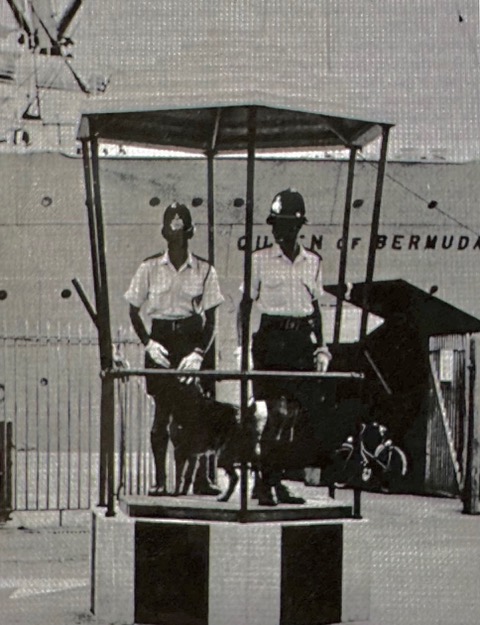
Ports Island, nestled between Nelly and Long Islands at the entrance to the Great Sound, hasn't really changed much since the days back at the turn of the century when it was an internment camp for Boer War prisoners. The old cedars are denuded of their greenery and the old fish pond, mortuary and cemetery have fallen into disuse, but otherwise the island remains the same — except for one thing.
Sixty years ago gloomy and sullen looks peered through scraggly beards and the language of the island was guttural Afrikaans. Today hundreds of children with beaming young faces clamber over the hills of the island and dive from its shores. Once an island of confinement, today Ports Island is an island of escape – escape from sometimes crowded conditions and the hot hustle-bustle of the mainland.
Outdoor life has been advocated by several Government officials in Bermuda as a step in solving Bermuda's growing menace of juvenile delinquency.
Both Mr. G. H. Robins, Commissioner of Police, and Captain Tony Murdoch-Muirhead, headmaster of the Junior Training School, are staunch advocates of programs along the lines of the Outward Bound schemes so popular and successful in England.
Perhaps in the future the Government may establish such programs on other Great Sound islands.
The Commissioner of Police, Mr. G. H. Robins, and his wife, Lou, had lovely plans for their holiday in the U.K. They were among the 89 local people who boarded the P & O liner Oriana on July 27. On arrival in England the Robins’ were planning to have a holiday on their own and then devote the rest of the time to their grown-up children — not to mention two grandchildren.
Unfortunately, fate took a hand and knocked these plans on the head. Two days after arriving in Southampton, Mrs. Robins was taken to the Royal Berkshire Hospital to undergo an emergency operation. I understand she is now recuperating, but chances are she will remain in England longer than her husband, who is due back early next month.
Mr. Hector Barcilon, the Solicitor General, is due to arrive back in Bermuda on Monday aboard Royal Mail Line's Essequibo. He has been on leave in the United Kingdom since the end of July.
Expected to return next Wednesday is the Commissioner of Police, Mr. G. H. Robins, who went on leave at the same time as Mr. Barcilon. Mrs. Robins will not be accompanying her husband. She is still recuperating in England following a serious operation in August, but hopes to be back in Bermuda next month. A rumour that the Commissioner was not returning to Bermuda was called "quite untrue" by a spokesman at the Colonial Secretariat, while a spokesman for the Police Force remarked that Mr. Robins was expected back in his office next Thursday.
In the House of Assembly, the deputy Speaker, Lt. Col. J. C. Astwood, moved that a message be sent to His Excellency informing him that the House had met. The Speaker, Sir John Cox, appointed Col. Astwood and Mr. DeForest Trimingham to convey the message down the hill. Five minutes later Black Rod, in the person of Deputy Police Commissioner Frank Williams, brought the Governor's reply that he would be reconvening Parliament at 2.30 p.m.
The Commissioner of Police, Mr. G. H. Robins, has returned to Bermuda after spending three months' leave in the United Kingdom. He hopes that his wife, who underwent a major operation in England early in August, will be well enough to join him at the end of next month oy early in December. During his absence, Chief Superintendent Frank Williams has been acting commissioner.
Good to see "Robby," as he is known to his friends, back in the Colony. To be more formal, Commissioner George H. Robins returned on Thursday afternoon minus Lou, his wife. She underwent a major operation in England early in August and is still recuperating. The police commissioner took a week's extra leave to make sure she was all right before returning to Bermuda.
"She's fine," he told me on the telephone, "and as soon as she has completely recovered, I hope she will be returning – possibly at the end of next month or early in December.”
Regarding the weather in England, he admitted that August and September had been disappointing, but described October – up to the time he left – as being "warm and dry."
However – and I hate to tell tales – how come he has returned to Bermuda with a severe cold?
Maj. Gen. Sir Julian Gascoigne, K.C.M.G., K.C.V.O., C.B., D.S.O., was introduced to members of the Police Benevolent Fund Committee at the Police Ball on Friday night. Approximately 400 persons attended the function including His Excellency the Governor, the Colonial Secretary, the Hon. J. W. Sykes and Mrs. Sykes, the Chief Justice, the Hon. Myles Abbott and Mrs. Abbott, the Attorney General, the Hon. J. C. Summerfield and Mrs. Summerfield, and the Solicitor General, the Hon. H. Barcilon and Mrs. Barcilon.
Music was supplied by the Castle Harbour resident orchestra and the Police dance orchestra under the baton of Alastair Johnson. This appearance was the debut of the police orchestra which consists of Alastair Johnson (piano), Gerry James (trumpet), Ted Fulger (trombone), Derek Dowling (sax), Donald Kunkle(tenor sax), Tony Small (drums) and Alex MacIntosh (bass). The guests were pleasantly surprised by the quality of the band and we feel that congratulations are definitely in order, the “beat” was excellent and we look forward to hearing from Alastair Johnson’s Temperance Seven in the future.
Members of the Force were well represented among the evening’s prize winners – “Spider” Mackenzie won a camera, John Swift was the envy of all when he won a cute doll (inanimate unfortunately) and Peter Stubbs won the two Ronson cigarette lighters within the space of about ten seconds with two lucky raffle tickets. It’s understood that his partner managed to persuade him to part with one thereby ruining his idea of some handy Christmas presents.
Compared to previous years, the attendance at the Ball was quite small but this made for more enjoyable dancing and the members of the Benevolent Fund Committee deserve praise for the efforts they put into the event.
I understand that the editor is now going around muttering “deadline for copy” so I must wend my way on my trusty bike and rush the copy to Prospect, give three taps on the green iron door and push the papers through the keyhole and get away before the editor collars me.
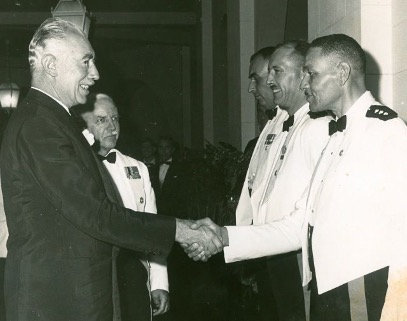
Detective Constable Desmond McSherry to Lucille Hart on June 30.
Constable Edward Foggo to Aloma Barnard on September 6.
Constable Gilmour Simons to Iris Linda Gumbs on September 13.
Constable Timothy Willis to Sandra Isabel Turney on September 27.
Constable George Garrod to Wilma Lee Purvey on October 4.
Sergeant George Goddard to Jeanne Franklin on October 18.
Woman Sergeant R. Neville to R. Spershott on October 20.
Constable Colin Finnegan to Thelma Schell on October 27.
Constable W. Woods to Jennifer Towers on November 12.
Constable W. Christopher to Betty Smith on November 15.
What would you do if an atomic bomb exploded within a hundred miles of Bermuda? Make for the open spaces or lock yourself indoors? Put on a white suit, or strip off all your clothes?
If you know the answers to these questions, and the dozens of others that will flash through the mind should such a disaster occur, you may live. If you don't, and you guess wrong, you may die.
It was with the intention of educating the people of Bermuda on what to do in such an emergency that the Bermuda Disaster Relief Organization held a special meeting on Tuesday.
Commissioner G. H. Robins and Chief Supt. Frank Williams of the Bermuda Police; Lieut.-Col. J. C. Astwood, M.C.P., Civil Defence commandant; Major H. J. Elverson, administrator of the King Edward Hospital; Mr. John Gladwin, director of the local British Red Cross unit; Dr. Avice Atkinson, lecturer of the Nursing Reserve; Mr. I. Hughes, of the Public Works Department; and Archdeacon J. Cattell.
The meeting examined a list of precautionary measures and heard a talk on the dangers of an atomic explosion and fallout from Col. Astwood. It was also stated the latest information on nuclear blast and fallout protection had been sent for from abroad.
Police and medical men as well as other authorities agree that one of the most important safeguards against fatal head injuries, which caused most of this year's traffic deaths, is the wearing of crash helmets. They feel strongly that if the accident victims had been wearing helmets the number of deaths this year would have been drastically reduced.
Dr. Ronald Evans Shaw, pathologist at the King Edward VII Memorial Hospital, went so far as to state during the inquest into the death of the most recent motorized cycle victim, Miss Joanne Mary Hart:
"I have no hesitation in saying at least 10 deaths arising out of cycle accidents this year would not have occurred if crash helmets had been worn." Speaking specifically of Miss Hart's case, he said: "The injury to the brain would undoubtedly have been prevented and in consequence she would not have died."
The Bermuda Police Force — "bobby" helmeted constables, policewomen, dog handlers, motor-cyclists and patrol car crews — gave an impressive display of strength and mobility at their annual inspection on Saturday.
Though spasmodic rain showers kept all but a sprinkling of spectators away from this usually popular event, there was nothing half-hearted about the parade itself.
Lined across the Prospect field behind their senior officers, the 100 police officers made an impressive sight for the Governor, Major-General Sir Julian Gascoigne, when he arrived in his official limousine.
Accompanied by Police Commissioner G. H. Robins, His Excellency inspected the ranks of regular and reserve constabulary and then moved to the rear to view the parade of police vehicles and their operators. There, too, were the four dog-handlers with their chained charges.
After the inspection, the official party moved to a [platform] where the salute was taken as the Force marched past to the band of the Bermuda Militia Artillery, followed by the fleet of motor-cycles and cars.
Then the Governor presented batons of honour to P.c. Geoffrey Payne (best all-round recruit, first basic training course) and P.c. Frank Mutch (best all-round recruit, second basic training course).
He also presented ten Royal Life Saving Society medals and certificates and 20 St. John Ambulance Brigade diplomas to members of the Force.
The ceremony was attended by a number of Parliamentarians including the Speaker of the House, Sir John Cox, and the deputy Speaker, Lieut.-Col. the Hon. J. C. Astwood. The elements brought happier stories, too.
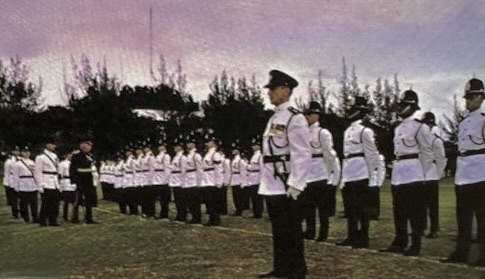
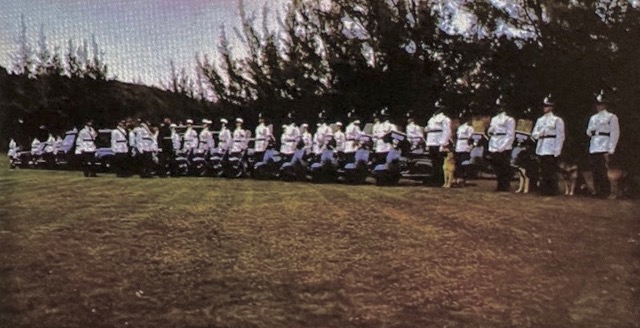
The Bermuda Police Magazine - Winter, 1962 page 62
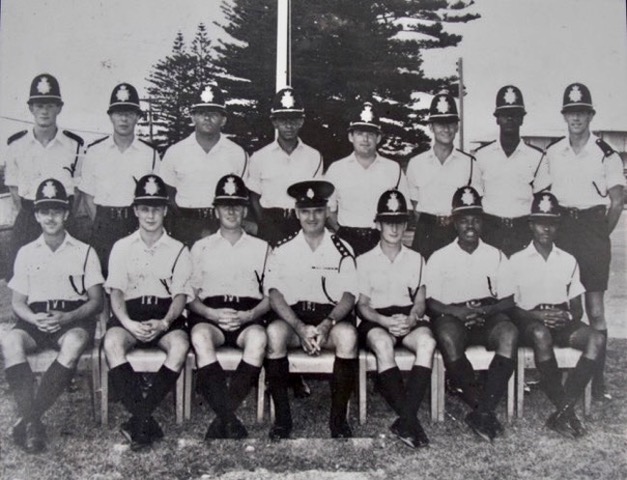
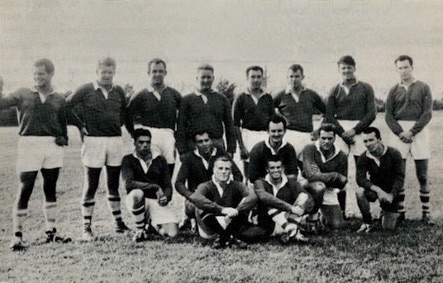
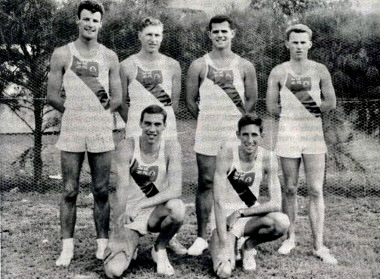
Having started off in this satisfactory manner, the team never looked back. At the end of April, under the capable management of Mr. Saunders and captained by Tony Harper, the team, consisting of Jeff Payne, Jack Rouse, Connell McBurnie, Adrian Brindle and Bob Bates, took part in the Jamaica Constabulary Sports in Kingston. The team hit the sports headlines in the Jamaica press, with two fine wins by Payne who won the Mile and Half-Mile and McBurnie who took the Mile walk in fine style. In addition to these spectacular wins, Jack Rouse won the Javelin and took a place in the Discus. Tony Harper was out of the winning positions but was second to Payne in the Mile and Half-Mile and was just taken on the finishing line by a Jamaican in a fast 440 yards. The team took part in a march past before the Governor of Jamaica who presented the prizes and congratulated the team on a fine effort ~ the six members covered twelve events and took four firsts.
